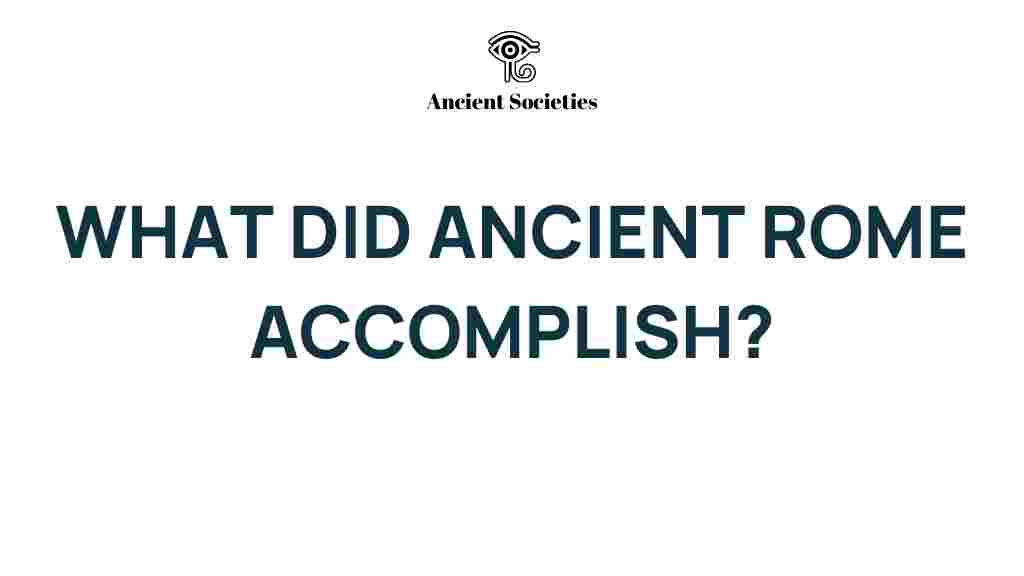Unveiling Ancient Rome’s Extraordinary Achievements
Ancient Rome is often hailed as one of the most influential civilizations in human history. Its accomplishments span various fields including engineering, architecture, governance, culture, and innovation, leaving a lasting legacy that continues to shape our modern world. This article will explore the remarkable achievements of Ancient Rome, delving into its profound impact on society and history.
Engineering Marvels of Ancient Rome
One of the most notable areas of accomplishment in Ancient Rome was its engineering prowess. Roman engineers were responsible for groundbreaking innovations that have stood the test of time. Here are some of their most significant contributions:
- Aqueducts: The Roman aqueducts are a testament to their advanced engineering skills. These structures transported water from distant sources into cities, ensuring a steady supply for public baths, fountains, and households. The Aqua Appia, built in 312 BC, is one of the earliest and most famous examples.
- Roads: The extensive network of Roman roads facilitated trade and movement across the empire. The phrase “All roads lead to Rome” stems from this incredible infrastructure, which was crucial for military and economic purposes.
- Concrete: Romans perfected the use of concrete, allowing them to construct durable structures. This innovation enabled the building of monumental architecture, including the iconic Pantheon.
Architectural Achievements
In addition to engineering, Ancient Rome is renowned for its architectural accomplishments that still inspire modern architects today. Key architectural features include:
- Colosseum: This grand amphitheater is a symbol of Roman architecture and engineering. It could accommodate tens of thousands of spectators and hosted various public spectacles.
- Roman Forum: The Forum served as the center of public life in Rome, showcasing impressive temples, basilicas, and public spaces that reflected Roman governance and culture.
- Baths of Caracalla: These vast public baths epitomize Roman luxury and social culture, featuring complex heating systems and beautiful mosaics.
Innovations in Governance
Ancient Rome’s governance system was another area of remarkable accomplishment. The Romans developed legal frameworks and political structures that have influenced contemporary governance worldwide. Some of their key innovations include:
- Republicanism: The Roman Republic introduced concepts of representation and civic duty, laying the foundation for modern democratic systems.
- Codified Laws: The Twelve Tables, established around 450 BC, were one of the first codifications of Roman law, ensuring that all citizens were aware of their rights and obligations.
- Senate: The establishment of the Senate provided a platform for political discourse, influencing legislative processes and governance.
Cultural Contributions
Ancient Rome was a melting pot of cultures, and its cultural accomplishments are vast and varied. From literature to arts, the Romans made significant contributions that enriched human expression:
- Literature: Renowned poets such as Virgil and Horace shaped Latin literature, influencing writers for centuries thereafter.
- Philosophy: Roman philosophers like Seneca and Cicero contributed to ethics and political thought, integrating Greek philosophical traditions.
- Visual Arts: Roman sculpture and painting captured the human form and emotions, often reflecting societal values and beliefs.
Innovative Technologies
Technological advancements in Ancient Rome were crucial in supporting their vast empire. Some remarkable innovations include:
- Military Technology: The Romans developed advanced weaponry and military formations that allowed them to conquer and maintain vast territories.
- Public Health Systems: The implementation of public health initiatives, including sewage systems and public baths, showcased their understanding of hygiene and its importance to society.
- Glassmaking: Ancient Rome advanced the art of glassmaking with techniques that allowed for the creation of glass windows, enhancing architectural beauty.
Societal Structure and Achievements
The societal structure of Ancient Rome was complex and multifaceted, contributing to its achievements and innovations. The class system, which included patricians, plebeians, and slaves, significantly influenced social dynamics and governance.
- Patricians: The aristocratic class held significant power and influence over politics and society.
- Plebeians: This common class fought for rights and representation, leading to political reforms that benefitted the broader population.
- Slaves: While often overlooked, the labor of slaves was integral to the economy and society, highlighting the complexities of Roman social structures.
Challenges and Troubleshooting in Understanding Ancient Rome
While studying Ancient Rome, researchers and enthusiasts may encounter challenges, such as:
- Fragmented Records: Much of Roman history relies on surviving texts, which can be incomplete or biased.
- Interpretation Variance: Different historians may interpret events differently, leading to debates over accuracy.
- Language Barriers: Understanding Latin and ancient texts can pose obstacles for non-specialists.
To navigate these challenges, consider the following troubleshooting tips:
- Utilize Multiple Sources: Cross-reference various historical sources to gain a more comprehensive view of events and achievements.
- Engage with Experts: Attend lectures or read works by established historians to enrich your understanding of Roman history.
- Explore Archaeological Findings: Stay updated on archaeological discoveries that provide new insights into Roman life and achievements.
Conclusion: The Enduring Legacy of Ancient Rome
In conclusion, the extraordinary achievements of Ancient Rome in engineering, architecture, governance, culture, innovation, and society have left an indelible mark on history. These accomplishments not only defined the Roman Empire but also laid the groundwork for future civilizations. As we continue to study and admire Ancient Rome, we must recognize the complexity and richness of its contributions to our modern world.
For further exploration of Ancient Rome and its remarkable history, you can visit this resource for more detailed information.
Whether you are a history buff or a casual learner, the exploration of Ancient Rome’s accomplishments offers invaluable insights into the foundations of contemporary society.
This article is in the category History and created by AncientSocieties Team
